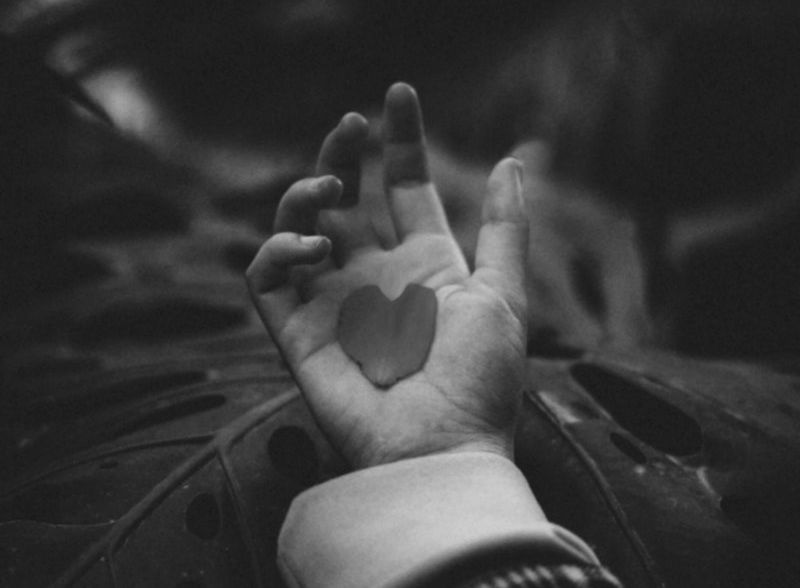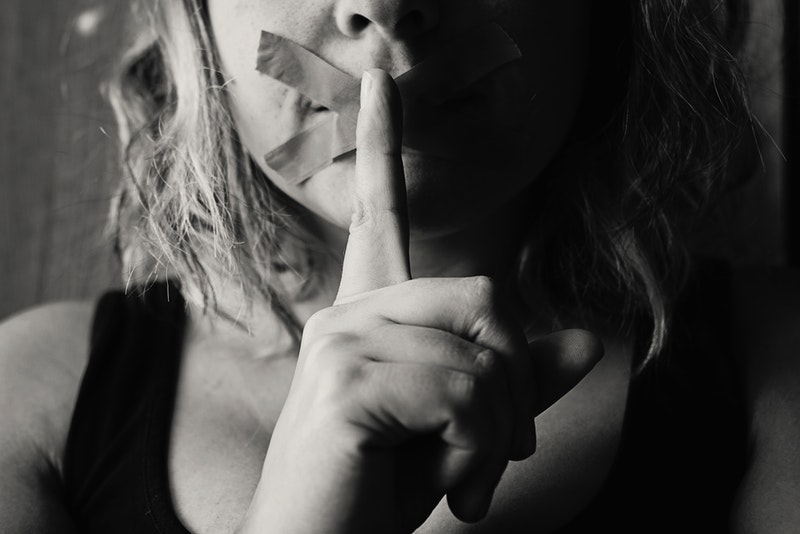At some point or another we’ve all heard these words before:
“Suck it up princess!” “Be a man!” “Stop being a cry-baby,” “Get over it,” “Stop being so sensitive,” “Get thicker skin!”
While these words were likely spoken without consciously intending us long-term harm, they nevertheless point to a common and undeniably tragic truth in our society: that expressing your emotions is a sign of weakness, rather than strength.

Soul Work Compass Course:
Feeling lost, stuck, and trapped in repetitive cycles of pain? Discover your Soul's Compass to reclaim your purpose and find your path to freedom.
⭐️⭐️⭐️⭐️⭐️ "I have been a long-time subscriber to their website, and it’s one of my favorites by far ... It is rare to find this type of teacher." – Shar B.
If you were born into an emotionally repressed culture that valued the “masculine” ideals of efficiency and logic, it is likely that you struggle with some level of emotional numbness.
If you were born into a family that shunned any form of strong emotional expression, it is even more likely that emotional numbing is an issue for you.
And if you experienced an extremely traumatic life event that was simply too overwhelming for you to handle (from which you haven’t recovered), I can almost guarantee that you suffer from emotional numbness.
So how does emotional numbness impact virtually every part of our life? And what advice can I share with you after going through my own struggle with this issue? Keep reading and you’ll find out.
Table of contents
What is Emotional Numbness?

Emotional numbness is a defense mechanism employed by the mind to avoid intense and overwhelming emotions such as fear, hatred, jealousy, and grief. When you go emotionally numb, you lose the ability to feel and experience your emotions on a psychological and emotional level. In this sense, emotional numbness is often clinically connected with dissociation, which is the disconnection from one’s memories, identity, environment, body, or senses.
What Causes Emotional Numbness?

As with most issues, emotional numbness goes back to childhood and the way we were raised by our parents. Being abused by our parents physically, emotionally, sexually, psychologically, or spiritually can contribute towards our inability to self-regulate emotions, which results in emotional numbness. Feeling alienated or disconnected from one or both of our parents, or family at large, can also contribute towards emotional numbness. Being punished whether directly or indirectly for expressing our emotions in childhood also creates emotional numbness.
Numbing our emotions may also start after a severely traumatic experience, such as witnessing acts of violence, being assaulted, experiencing rape, suffering intense loss, or anything that we didn’t have the capacity to psychologically and emotionally handle in the moment. For this reason, emotional numbness is often a symptom of PTSD and various anxiety disorders. You can take our free emotional trauma test to explore this further.
Want to get LonerWolf at the top of your Google search results?
Emotional numbness is also influenced by our culture and wider social circles, particularly those that emphasize being stoic, rational, and emotionally invulnerable (e.g., British, Chinese, American, Russian).
The Danger of Emotional Numbness

If you even have the slightest inkling that you might be emotionally numb, it’s time to listen up. Emotional numbness is not a small character flaw or minor area of self-growth to improve in – it is a serious problem which needs to be addressed immediately.
Speaking from experience, emotional numbness has formed the root of many issues I have faced (and still continue to face) in my life. Due to my upbringing in an emotionally stunted, dogmatically religious family whom I felt disconnected from for the majority of my life, I never learned how to handle strong emotions. I was punished verbally, emotionally or physically anytime I expressed strong emotions, and freethinking or any form of dissent was rejected, resulting in being ostracized.
The combination of having a British father and a mother who was traumatized by her own emotionally unstable mother – on top of an oppressive fundamentalist religion – led to grooming me as a stoic and “stable” person who was taught that expressing emotions was not only bad but shameful.
As you can see, sometimes there are numerous factors at play that may contribute to your inability to regulate intense emotions, and therefore resort to unconsciously numbing them. In my case, I learned that strong emotions = punishment in one form or another, and so I learned that they were dangerous to experience.
The danger of disconnecting from your emotions is that it can lead to a host of mental, emotional, physical, and spiritual issues. Such issues may include dysfunctional coping mechanisms (obsessive compulsions), mild to severe depression, spiritual emptiness, inability to enjoy life, inability to form close and fulfilling relationships, disconnection from inner self, confusion, irritability, fatigue, addictions, chronic illnesses, and somatic illnesses (illnesses produced by the mind).
In extreme cases (and I’m talking about situations where emotional contact is nil), emotional numbness can lead to acts of cruelty.
Why is it ‘the Secret Illness’?
I call emotional numbness the secret illness because it is so pervasive in our society, and so socially acceptable, that it often flies underneath the radar. In a society that largely doesn’t know how to handle strong emotions in healthy ways, being stoic and “level-headed” is valued – yet this very same calm and collected facade often conceals unhealthy detachment from one’s feelings. Thus, emotional numbness is a secret illness because so many of us struggle with it, yet don’t even realize that we have it until chronic issues start emerging.
Download FREE Worksheets!
Go deeper with an emotional numbness journaling prompt + printable meditation mandala!
13 Signs You’re Struggling With Emotional Numbness

Emotional detachment is not always a bad thing. It comes in handy when you need to maintain boundaries, avoid undesired energy overload from others, and even help others in crisis situations. But emotional detachment turns into its unhealthy twin (emotional numbness) when it becomes an automatic inner defense mechanism.
“What’s so great about feeling strong emotions?” you might ask. The answer is that without feeling our emotions, we don’t have the capacity to live and learn from them or experience the beauty and depth of life.
Would you like to save this?
Your information will never be shared.
Here are some of the most significant signs of emotional numbness that you should look out for:
- Inability to express strong negative or positive emotions
- Inability to “fully participate” in life (i.e., feeling like you’re a passive observer)
- Feeling that life is like a dream (a sense unreality)
- Living on autopilot
- Lack of interest in activities others find enjoyable
- Feeling distant from others
- The tendency to withdraw from friends and family members
- Emotions are only felt in the body as sensations, but not by the mind (or else are completely muted in the body and show up only as illness)
- Dislike of people who express strong emotions (both positive and negative)
- Not feeling anything in situations that would usually generate strong emotion
- Panic or terror when strong emotions eventually breakthrough
- Feeling empty inside
- Physical and emotional numbness or “flatness”
In extreme circumstances (such as in PTSD sufferers), emotional numbness may even influence the desire to commit suicide. If you are considering suicide, please seek out support immediately (click here to locate your country’s suicide hotline).
How to Overcome Emotional Numbness

Like any psychological defense mechanism, emotional numbing can be complex to deal with, and often requires support from a trained professional such as a therapist.
If you feel that emotional numbness is significantly impairing your life, please do an act of self-compassion and seek out support either locally or online (there are even free counseling services online such as 7cups).
For the time being, here are some helpful practices which I have personally found to increase my ability to feel, cope with, and express strong emotions:
1. Anchor yourself to your body
As mentioned above, emotional numbing is connected to dissociation (mental disconnection from one part of yourself). In my case, whenever I experience strong emotions, my automatic response is to either (a) only feel the emotions in my body, not my mind, or (b) to have a complete meltdown. In both cases, one of the best self-soothing mechanisms I’ve learned is to anchor myself to my body through mindfulness and physical contact. Similar to what a mother does with her child, I tightly but gently hold one area of my body – usually my hand or stomach. This method helps me to feel contained and grounded in my body.
I also recommend using shapewear or a pressure vest to help you in extremely emotionally turbulent periods to anchor yourself to your body (here is a good example of shapewear). Shapewear is used by women and men to keep “love handles” and other body parts slim and defined. For our purposes, shapewear is like a hug to the body that will help you feel safe and ‘held together.’ Pressure vests are a little more expensive and they are used by people with sensory integration disorders (such as autism) to relax.
2. Deep breathing
Whether used alone or in conjunction with the above-mentioned technique, deep breathing is a simple and easy way to help you mindfully move through whatever you’re experiencing. This practice is particularly useful when intense feelings such as fear or rage break through. There are many books out there that talk about the importance of deep breathing (such as this one), and there are many online tutorials with breathing techniques. I recommend sticking to something simple, something you don’t have to think about too much, and something that doesn’t feel forced. The point of deep breathing isn’t to follow someone else’s technique perfectly, it is to use your breath (in whatever way suits you), to calm your mind and body. Also, I recommend breathing slowly, deeply, and softly instead of forcing deep breaths (which can increase anxiety) – let your breath be natural. Read more about how to relax using deep breathing.
3. Keep a journal of sad thoughts

I realize this suggestion may sound a tad bit melancholic, but it’s a practice worthy of your time and effort, particularly if you’re wanting to feel and express your emotions. Journaling is also a powerful form of shadow work (a way to express what you would usually suppress).
In a physical journal or online diary, spend five to ten minutes every day writing down something which triggers even the slightest pang of sadness in you. For example, you might write down a memory of your dog who died, an issue in the world, something someone said to you, a scene from a movie, a daily struggle … or virtually anything that is upsetting (or what you imagine would be upsetting).
Creating a sad thoughts diary has two main benefits. One, it helps you express your emotions, even if in an indirect way at first. And two, it acts as a catalyst for feeling and letting out your emotions, particularly when you need momentum (I’ll elaborate more on this soon). Learn more about how to journal.
Always try to finish your sad thought journalling with something uplifting, like reading the uplifting news subreddit, spending time with someone you love, playing with a pet, or watching something entertaining on youtube or Netflix.
4. Catharsis (let it all out, baby!)
When emotionally numbing ourselves becomes our default defense mechanism, we tend to have a huge amount of suppressed emotion lying just beneath our conscious awareness. In order to safely and effectively express your suppressed emotions, try some form of catharsis. Catharsis may involve screaming into or punching a pillow, using your sad thoughts journal (mentioned above) to stimulate sadness and crying, intense emotional-fuelled exercise, impassioned dancing, or an active meditation.
Regular catharsis should be a must on your journey. Without regularly ‘letting it all out,’ you run the risk of experiencing the repercussions of festering emotions (i.e., depression, emptiness, chronic illness, etc.).
5. Yoga and self-massage
Yoga is a well-known way of helping to clear and balance your energy. Not only that, but yoga often has a way of releasing emotions stored in the body. I recommend doing slow and gentle forms of yoga such as Hatha yoga for at least ten minutes a day. Remember, the goal isn’t to become some Instagram-perfect yoga star; it is to connect with your body, mind, and heart.
The truth is that our unexpressed and repressed emotions are often stored within our bodies. I like to think of our bodies as being reflections of our unconscious mind: they are maps that help us to figure out what we are keeping locked away, and what unresolved issues we need to face. In my article about chronic muscle tension, I list the nine types of emotions trapped in different areas of the body. In order to release these emotions, I regularly use something called the ‘Acuball’ to introduce fresh blood flow and energy into these tense areas. I like the Acuball because it gives me a deep tissue massage, while also helping me to stay grounded in my body, relax, and release pent-up stress. (You can get the Acuball here).
6. Creatively express your feelings (or lack thereof)
Write a song, doodle in a journal, paint a picture, create a collage, find some way of expressing what emotion you last felt. If you struggle to feel anything at all, express that artistically. Grab those greys and blacks and turn that damn page into your own work of art. Pay attention to how you feel afterward. Does even the slightest feeling of satisfaction enter you? Journal about these emotions.
7. Take care of your inner child
As it was your child self that likely copped the trauma that caused you to default to emotional numbing, take care of this part of you. Practice inner child work and find ways of comforting and nurturing this vulnerable place within you. You may even like to create empowering affirmations for your inner child to help him or her access emotions. For example, you might repeat to yourself when you are in a difficult circumstance, “It is OK for me to feel,” “It is safe for me to feel sad,” “My anger is valid,” “Being vulnerable is being strong,” and so forth.
8. Dedicate space and time to feeling
In our busy lives, it is very easy to numb and distract ourselves with social media, the TV, shopping, food, social commitments, and other things that constantly cause us to look outside. Looking inside is much harder and requires far more self-discipline, hence why most people don’t do it. If you are serious about overcoming your emotional numbness, you will need to dedicate space and time to all of the activities I have mentioned in this article. If you struggle with self-discipline, I recommend making yourself externally accountable by joining a spiritual meditation group or other practice to help you turn inwards. Please don’t skip this step, it is imperative that you spend time exploring your inner self, and in particular, what you are repressing and why.
Emotional Numbness Q&A

Here are some commonly asked questions about emotional numbness. Hopefully they’ll answer any remaining concerns or thoughts you may have about this topic:
The simple answer is trauma. Usually, emotional detachment (or numbness) can be linked to early childhood experiences such as being abused mentally, emotionally, sexually, or physically. However, not everyone who experiences emotional detachment had tough childhoods. Sometimes, other traumatizing experiences later in life can trigger emotional detachment as a protective mechanism (such as divorce, job loss, rape, illnesses, war, etc.).
Yes, emotional numbness can mask intense feelings of anxiety – it’s the mind’s way of protecting itself from being flooded by overwhelming emotions. Numbness is a primal reaction to fear and is also known as the freeze response. There are three main reactions to anxiety-provoking situations that we have: fight, flight, and freeze.
To fix, or rather regain the ability to feel again, it’s important to be gentle with yourself. Try reconnecting with your body, practicing deep breathing, doing some catharsis, journaling, and creating a safe environment for yourself. Seeking out professional support is usually crucial, as emotional numbness is usually a major sign of a traumatized nervous system. To regulate your nervous system, you need a safe holding environment, which a professional therapist/counselor can provide.
***

I hope this article opens up new possibilities for you – or at least inspires you to take emotional numbness seriously.
I can’t emphasize enough how important it is to face this issue because avoiding it will only prolong your suffering.
If this article has helped you, please let me know. It brings me a sense of satisfaction to know that I am helping someone out there somewhere. Also if you struggle with emotional numbness and have other techniques or tools to recommend not mentioned in this article, please comment below. You never know how far throughout this world your advice can spread. :)
Please note that this article has affiliate links. If you decide to purchase anything we link to, we get a small percentage to help with our work at no extra cost to you. Thanks!
Whenever you feel the call, there are 2 ways I can help you:
1. The Soul Work Compass Course: Ready for deep transformation without the fluff? The Soul Work Compass provides a step-by-step path to finding your inner truth and life direction. Heal core wounds, clarify your values, and walk away with a concrete guide for living. Get started now!
2. The Inner Work Journal Bundle: Stop surface-level healing. Dive into the depths with 150+ journaling prompts designed to help you face your demons, heal childhood wounds, and embrace your shadow. Three sacred journals, lifetime access, print as many times as you need. Real transformation starts here.

 $3
$3
When I was having trouble letting myself feel any emotions my counselor taught me a self-hypnosis technique. You set a time limit and a signal to awake. Then you experience three things you SEE, three that you HEAR, and 3 that you FEEL; then repeat with two of each, and finally one of each. This gives you a safe way to let the emotions surface without fear of being overwhelmed.
Thank you so much for sharing this technique with us Kay!
Dear, your writing has deeply touched me and I’d like to express my gratitude for your generosity. I have just recently begun my Shadow work and I am convinced that one has to first learn to love the self that is familiar prior to starting this deeply emotional work. Finding my authenticity is based on my practice to find gratitude in absolutely everything. I have to admit that I am a loner by choice because I did not have anything to give of myself. I had manufactured most of my life in avoidance of my shadow. I was not ready to get to know my authentic self. Finding my authenticity is my goal. I have learned to love myself during the process of awakening. I feel this love to be strong enough to face, embrace, forgive, and let go of everything that no longer serves me. Gratitude for your support <3
After 45 was elected I started to shut down and found myself becoming emotionally numb just to deal with the trauma of what had happened in my country and the overwhelming negative influences this administration has been having on our nation and the world. Now I feel like I’m finally rising out of it because of the strong emotional impacts of current events and the hope I’m feeling that this new generation will actually be able to affect the positive changes we so desperately need to transform into a better country and world for everyone. I’m 63 so I thought maybe it was menopause or the maturity of old age or cognitive decline that was mellowing me out, but no, I was emotionally flat lining to protect myself from the pain and suffering that I was feeling from the collective. I’m not feeling as “numb” now since I’ve been expanding my spiritual practice, exercising more, connecting with family and friends more, eating healthier and spending more time in Nature. I cry more, laugh more, feel more and the gray colors are becoming more technocolored again. I’m starting to feel more Alive again. I’ve got a ways to go, but I feel it happening. I appreciate the work you two do for others, and I read many of your posts and am even writing occasionally in the Shadow Work journal. Keep up the good spiritual work you do, and much love and many blessings to you both!
Thank you so much for this article. I am in the middle of trying to allow myself to feel again esp anger. Its not easy as I feel so depressed. Just one question I have- I am all about attracting the energy you give out (Abraham Hicks is helping me a lot lately) and therefore try to think and remain positive, and am therefore a bit fearful of letting out or paying attention to negative emotions for more than a few minutes. How can I express my grieve and anger without attracting more of it in my experience as sending out these negative vibes would attract more of them? Can you help me out? Thank you
Yes! Thank you for this article. This must be why I don’t cry. I am healing and after many years of therapy on and off, I am finding the most help from your website and the tools that you offer. It’s never too late.
Thank you for the work that you do. It scares me when I think of how many years I have spent being emotionally numb. I made a huge connection in therapy last year that I was aggressively spanked as a child whenever I expressed anger. Growing up in the Southeastern US where children are often hit with heavy hands, belts and “switches” (tree branches), I thought my experience was normal and had no effect on my ability to regulate my emotions. But the reality is that I have experienced almost every one of these symptoms, from depression, compulsions, to totally consuming hypochondria and somatic illnesses. Nowadays… I practice allowing myself to feel whatever comes up without any judgement. In recently identifying how much repressed anger I have from being expected to hold in all my emotions and people please as a woman, I have just begun the journey of utilizing breath work and body movement to sit/move/breathe through when trauma and sadness comes up during my morning yoga (which it always does). It is a very heavy journey, and at times I get quite scared of the intensity, but I try to remember how much lighter I will feel the more I clear out my old, repressed emotions and gently continue holding my own hand. Thank you again for your work. You all are my favorite spiritual website by far.
A powerful article, thank you. I realize just how bad my childhood was reading this, and how much dissociating I did
Take good care of yourself, Sarah, and be sure to find some outside support. This is a hard realization, to be sure. <3
I am on this journey & I am so grateful for this guidance and insight. My inner child needs to be told that it is safe for her to feel sad.
Your past experience sounds like mine.
And only now am I beginning to welcome that I am not alone and that is okay to be struggling AND still be worthy of connection, in whatever area myself as a person is struggling in. Because everything was/is extremely provoking leading to shame and isolation from expressing/feeling and struggling with things. “You’re supposed to have it all together Tristan. Be perfect. Emotionally stable. Before you are welcomed here as enough”.
I’m glad that I finally start to feel not alone but that frightens me as I don’t wish to enter some sort of wounded victim mentality, as I am not broken. It’s a tendency to want to fit in and belong. So I don’t want to upset people and feel more alienated in that even though we’re all working through something, I am so grounded, okay, and rooted in my experience and that may rub people the wrong way. So it’s easier to identify with some sort of “I’m broken, I’m healing” story to fit in. So in that, I am isolating myself too.
But I’m glad I’m not alone in this and I look forward to when some community doesn’t seem too intense for me to enter into.
Your level of self-insight is quite deep, Tristan. I think you’re doing just fine. Healing progresses at its own rate and according to its own flow, so keep seeking and you will find. :) Much love
With all these people throwing around the term “racism”, an incident that happened when I was a child (my guess around 5-6 years old) brought up the word “racism” into my consciousness. I am not talking about racism at an intellectual level, like what we see on social media or the “-isms” thrown at the President; I am talking about true racism felt at the visceral level. What’s even more interesting is that whenever I have a personal self-development issue, this particular incident ALWAYS shows up, regardless of what label I give it. However, calling it “racism” seems to have resonated with me in a way I never felt before.
Obviously I was deeply hurt by it and now I’ve peeled off enough layers that it is time to face it. In the end, racism may not have had anything to do with it; however, it is obvious that I was at some level traumatized by it.
It’s amazing how incidents that emerged so long ago can have such a profound impact on us and can cut us so deep. Have you tried exploring why this incident of racism hurt you so profoundly? That question might help to peel back the layers even more deeply and perhaps reveal a doorway to alchemizing this pain. Much love <3
If thats the case, man in general is suffering more on this. It is a common belief that a man needs to be “strong” and “man up” and stoic. It is believed that this is required for a man to be described as “capable and reliable” to handle all the responsibilities that comes if he is to be accepted as someone’s husband.
In the social settings, a man expresses too much emotions will be laughed at or mocked. He will have great risks of getting isolated by his peers for the “girlish” characteristics he shows. These all add up to be great amount of pressure for a man to be emotionally healthy.
I agree Dan. I feel so much sadness and compassion for men as they are literally brainwashed to believe, since birth, that being emotionally numb = being a “true” man. What a load of baloney. Thankfully the old paradigm of the “stoic” emotionally-stunted male is slowly coming to an end. True strength lies in intelligent vulnerability.
When I feel emotionally numbness singing Frank Sinatra music connect me to myself .Music is healing the words I sing I become part of me ,as the person who lived it .When you sing it is like yelling or speak singing in a healthy loving way.The oxygen that is exchanged is allowed to heal your body and spirit.I sing along ocean shores ,a different true Smile of people’s true-self bloom ,their inner child releases and makes the world a better place.I will sing for hours ,3 to 7 hours of release.Some people will cry that is a good release from their pain,I can feel their pain and energy.Because I’m an empath. I can feel society and people ‘s emotions.Be still ,listen, and watch it is in the air the frequency ripples. It could be someone in pain, getting married, or going to die. Love fill the sea, even the little sparrows at my feet and ducks and swans love it